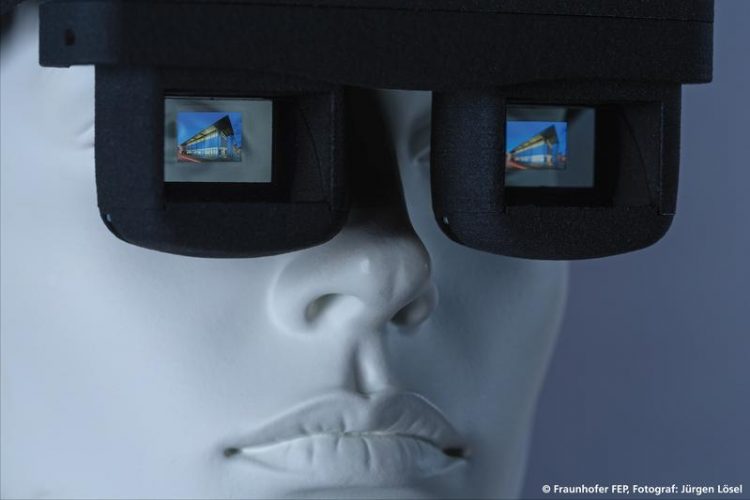OLED microdisplays in data glasses for improved human-machine interaction

Interactive smart eye-glasses using bi-directional OLED microdisplays Jürgen Lösel
“Augmented-reality” and “wearables” have become terms we encounter almost daily. Both can make daily life a little simpler and provide valuable assistance for patients, athletes, and in manufacturing. With the help of the so-called bi-directional OLED microdisplays, which are developed by Fraunhofer FEP, the function of “wearable displays” and hands-free eye controlled systems are joined together in a unique way.
“Eye-controlled augmented-reality smart glasses using our OLED microdisplays can be designed to be relatively small and light-weight since the display and image sensor are integrated on a single chip. A new and improved development platform is now available to our clients for creating proprietary products”, explains Judith Baumgarten, Project Manager at Fraunhofer FEP.
The current generation of color bi-directional microdisplays offers SVGA resolution (800 × 600 × RGBW) and for the first time sufficient image quality to become established in this market segment. The updated hardware design with standard HDMI and USB interfaces likewise contribute to getting established.
The eyeglasses exhibited at AWE Europe 2016 originated within the FAIR Project completed this year, was funded by the German Federal Ministry of Education and Research (BMBF). The project objective was to develop smart glasses for human-machine interaction, with control based on visual information captured and derived from eye movements.
The bi-directional full color OLED microdisplays integrated into see-trough data eye-glasses under this joint project were designed by project partner Trivisio, who developed a specialized mechanical design to fit the head in order to achieve good comfort and wearability. The electronics were integrated completely into the glasses so that they can be connected to a PC without an intermediate controller.
Where can these types of smart glasses become beneficially employed?
Various use-cases were examined and suitable application software for guide-by-eye control were developed by project partners Interactive Minds and Mecotec. One application developed is a communications and entertainment platform for ALS patients. It converts pre-composed text segments as well as those created by the patients themselves into audible speech signals, as well as enabling photographs to be selected and displayed, and videos and music to be watched and listened to.
Another application was developed for industry. In this case the glasses were used for calibration of pressure regulators in production facilities. Technical University Dresden monitored the project both with respect to the ALS patients (through the university’s Klinik und Poliklinik für Neurologie (hospital and ambulatory neurology)), as well as carrying out studies on ergonometry and user-friendly design (via the Chair for Industrial Psychology and Applied Cognition Research).
Besides these application examples, the advanced bi-directional OLED microdisplays of Fraunhofer FEP open up a whole world of possibilities and opportunities. The displays can be acquired in various evaluation kits for industry partners to test out their own ideas. This facilitates the integration of the displays in client-specific applications, and our scientists look forward to new research and development projects.
The SID-ME 2017 conference in Dresden next year (March 13th – 14th) is dedicated to the world of “wearable displays” and everything that goes with them. Experts will meet here to discuss technologies and applications.
The initial information on the program and first call for papers can be found at: www.fep.fraunhofer.de/sidme17.
The project partners would like to thank the German Federal Ministry of Education and Research (BMBF) for funding the FAIR research project (funding reference 16SV5842).
PRESS CONTACT
M.Sc. Annett Arnold | Head of Corporate Communications | Fraunhofer FEP | Winterbergstr. 28 | 01277 Dresden, Germany | Phone +49 351 2586-452 | Fax +49 351 2586-55452 | Email Annett.Arnold@fep.fraunhofer.de
Media Contact
All latest news from the category: Power and Electrical Engineering
This topic covers issues related to energy generation, conversion, transportation and consumption and how the industry is addressing the challenge of energy efficiency in general.
innovations-report provides in-depth and informative reports and articles on subjects ranging from wind energy, fuel cell technology, solar energy, geothermal energy, petroleum, gas, nuclear engineering, alternative energy and energy efficiency to fusion, hydrogen and superconductor technologies.
Newest articles

A ‘language’ for ML models to predict nanopore properties
A large number of 2D materials like graphene can have nanopores – small holes formed by missing atoms through which foreign substances can pass. The properties of these nanopores dictate many…

Clinically validated, wearable ultrasound patch
… for continuous blood pressure monitoring. A team of researchers at the University of California San Diego has developed a new and improved wearable ultrasound patch for continuous and noninvasive…

A new puzzle piece for string theory research
Dr. Ksenia Fedosova from the Cluster of Excellence Mathematics Münster, along with an international research team, has proven a conjecture in string theory that physicists had proposed regarding certain equations….



